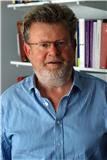Skeptics and Believers: Religious Debate in the Western Intellectual Tradition is an excellent series of lectures by Dr. Tyler Roberts, professor at Grinnell College in Iowa.
Roberts (b. 1962), who has a Th.D. degree from Harvard University, gives 36 lectures in the DVD series produced by The Teaching Company. I have heard only about a fourth of them to this point, but I have been impressed with him and his lectures.
A few days ago I watched and listened to “Pluralism—Religious and Secular,” his 35th lecture in the series. In it Roberts identifies and discusses five possible contemporary models for thinking about religious diversity.
He begins with a discussion of the usual three: exclusivism, inclusivism, and pluralism, the tripartite analysis presented by Alan Race in 1983, although he doesn’t mention Race. (I wrote about Race and my dissatisfaction with his threefold division in my blog posting on 8/10/10, which can be accessed here.)
Roberts goes on to suggest two more possibilities: “postmodern confession” and “secularism.” I plan to write more about secularism soon, but now I want to think more about the fourth position, which I found pregnant with meaning.
Postmodern confession is an idea developed by John Milbank, a British theologian best known as a leader of the “Radical Orthodoxy” movement.
I have not read Milbank sufficiently, but according to Roberts he (Milbank) argues that there is really no such thing as pluralism. The idea of religious diversity or religious pluralism, he says, is a concept that developed in the modern West.
In reflecting upon the world religions, I think Milbank is correct on that point. Certainly Judaism has never been pluralistic, except for some modern (liberal) expressions of that ancient faith in the U.S. And Islam does not recognize pluralism, with maybe, again, a few exceptions of liberal Muslims in the U.S.
Hinduism and Buddhism may well be considered inclusive religions, but it would be a push to call the position of traditional or most contemporary Hinduism or Buddhism pluralistic. Milbank seems to be right: religious pluralism is a Western idea that has been developed mostly by liberal (or cultural) Christians.
Roberts summarizes Milbank’s position: “Christian exclusivism is the only real pluralism because it is the only real respecter of difference.” He makes that contention because of the centrality of love to (true) Christianity.
This sort of Christian exclusivism is, as Milbank suggests, paradoxically, “the only real pluralism,” for, properly understood and practiced, it is the position which respects differences and enables people of any or all religious traditions to flourish.
Milbank’s ideas resonate with what I have been thinking recently: I respect adherents of other religious traditions not because of their faith (that is, not because I have thoroughly examined them and judged them worthy of respect) but because of my faith in Jesus Christ.
Since Christ taught, and exemplified, love for all people, I respect (love) others with different religious faiths or worldviews because that is the demand of love. Accordingly, I accept and affirm the freedom of all others to believe and to practice whatever they think is right and good, so long as it is not injurious to others.

.jpg)